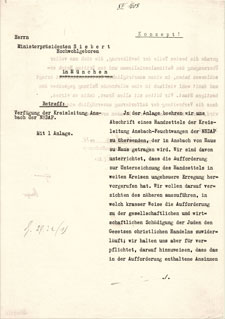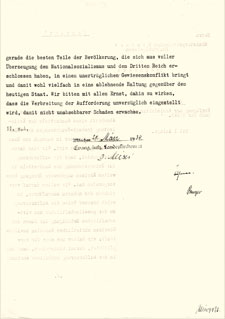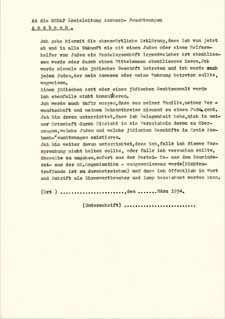Meiser: Against the Jewish Boycott in Ansbach
The National Socialists organized nationwide a boycott of Jewish businesses, attorneys and physicians on April 1, 1933, which was unprecedented in German history. A few days later, Jewish civil servants were dismissed from their posts. Jewish attorneys were additionally refused admission to the bar and limits were imposed on the admission of Jews to universities. These were the measures with which the Nazi regime began implementing its aggressively anti-Semitic program. Protestant church governments remained silent.
This was also true of the Bavarian regional church. Nevertheless, Regional Bishop Hans Meiser (1881-1956) took the ostracism of the Jews from public life as an opportunity to report on the treatment of “non-Aryans” at the regional consistory’s meeting on August 30, 1933. As a result, the regional consistory resolved to remonstrate with the ministry because much injustice is being suffered by these actions (K.-H. Fix, Glaubensgenossen, 35). Reich Minister of Justice Franz Gürtner (1881-1941), whom Meiser knew personally, was supposed to be the recipient of this remonstration. Whether such a letter was actually sent off is not known to this day.
Regional bishop Meiser lodged a written protest against a local boycott of Jews, however. In March of 1934, the NSDAP’s district headquarters in Ansbach-Feuchtwangen distributed handbills with a declaration that called upon residents to pledge solemnly from then on and for all time not to do any business with Jews, no longer to go to Jewish businesses, physicians’ practices and law offices and to bar Jews from entering German private residences.
In zealous racial fanaticism, the district headquarters demanded that signatories also make their families promise to stay away from Jews and, by looking a directory, see for themselves what Jews and what Jewish businesses exist in the district of Ansbach-Feuchtwangen. Whoever contravened this declaration was threatened with immediate expulsion from the party and its organizations and would have to expect to be defamed publicly in speech and print as someone who breaks his word of honor and is miscreant.
In his letter of protest of March 29, 1934, Regional Bishop Meiser urged Bavarian Minister President Ludwig Siebert (1874-1942) to have a stop put to the distribution of this declaration immediately. In no uncertain terms, he pointed out how flagrantly the demand to harm the Jews socially and economically is contrary to the principles of Christian conduct.
Meiser further wrote that the demanded declaration brought the best segments of the populace, which have become receptive to National Socialism and the Third Reich out of utter conviction, into an intolerable moral conflict and thus to view the present-day state negatively. This argumentation was characteristic of the church’s policy of remonstrating and petitioning, which endeavored to bring about changes in the given political situation without fundamentally attacking the Nazi system.
Source / title
- © 1+2: Landeskirchliches Archiv Nürnberg, LKR 1608 a



